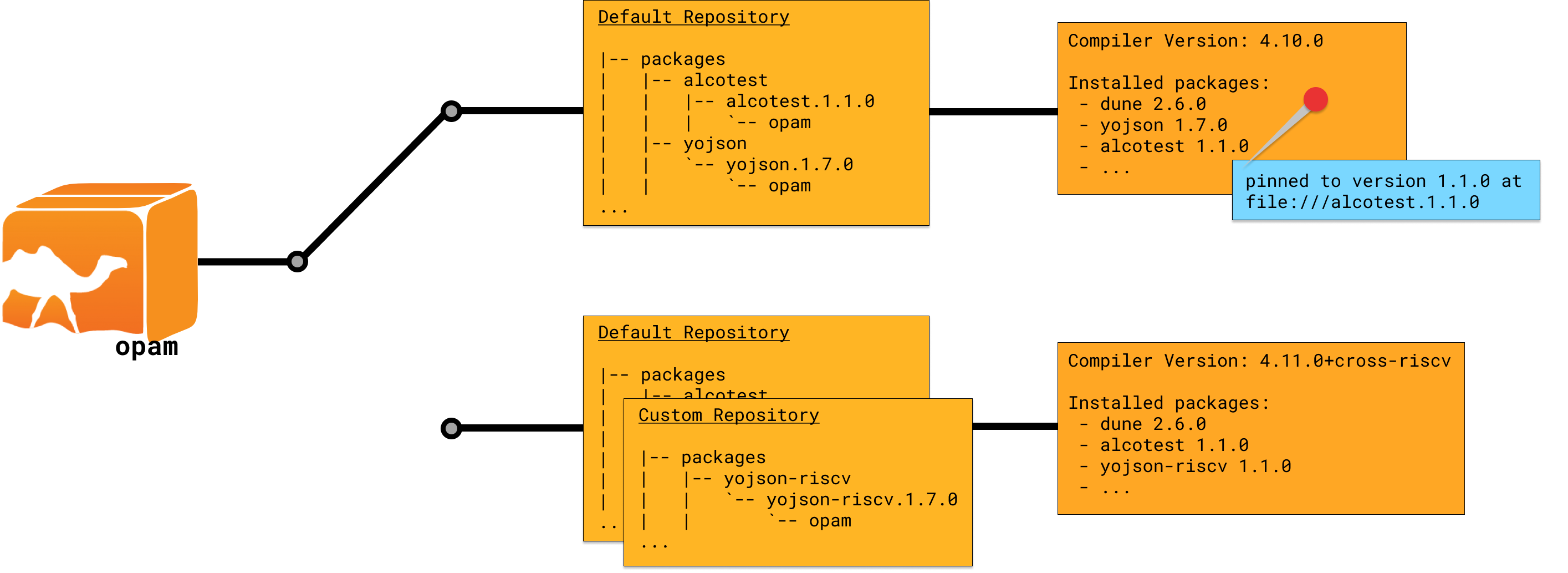Opam Client
The Opam client is a tool used to work with Opam, an OCaml Package Manager
Overview
opam is an OCaml Package Manager. It handles the sharing of libraries and code, dependency management and installation. In addition to this it also handles compiler installation. Opam handles what the following do for other languages:
- Rust:
rustup&cargo - Node (Javascript):
nvm&npm(oryarn) - Python:
pyenv&pip

A simplified diagram of some of the key features in opam.
Key Concepts
Repositories
Opam repositories are the source of truth for what opam can and cannot install. If the repository doesn't have package X with an opam file, then it won't be installed. The default repository is where most people will begin and end their journey with repositories. This is where you can publish new releases of your libraries and others can update and upgrade to these versions.
This is held on Github: ocaml/opam-repository
Note in the diagram above, in the unselected switch, there are two repositories. There is no limit on the number you can have and when installing libraries opam will check each for a folder that matches what you are looking for. The above is an example of what you would have to do to start cross-compiling. If you are interested check:
Updating & Upgrading
Hopefully with the explanation of repositories it is a little clearer what updating and upgrading means. When you install and opam switch you get a local cloned copy of the opam repository. As you code this will remain unchanged even as library authors publish new releases.
To get the newer (and hopefully better!) code you will essentially have to git pull the latest opam repository (opam update) and then tell opam to install the latests version of libraries (opam upgrade). By supplying a single package to these commands you won't update and upgrade everything.
Within your library opam file you can specify constraints on version numbers to ensure your code works correctly. A major version change say irmin.1.0.0 to irmin.2.0.0 would likely break your code.
Pinning
Pinning is a method for overriding the opam repository. In the diagram our repository has a version of alcotest at 1.1.0 - under normal circumstances this is what will be installed and used to build libraries that depend on it.
But say we want to add a new feature or fix some code in alcotest and then try building some libraries that use it, do we have to release a new version or manually change the opam repository? No. You can run opam pin add alcotest . --kind=path from within the alcotest library.
It is important to know that opam is git-based when it comes to source code hence the need to specify --kind=path otherwise it will try and use the latest commit and you don't want to commit every time you want to try to change something.
Source and Show
Source and show are very useful commands for library authors. Source downloads the latest code attached to the version of a given library.
Show allows you to see the metadata associated with a library. You can even print the opam file with: opam show <library> --raw
Plugins
Plugins in opam are ways to extend opam's functionality in a more accessible way (anyone can write a plugin!). One of the most used is depext - you can tell it is a plugin from it's opam file which has tags: "flags:plugin". Depext tries to install external dependencies for you. Other plugins include opam-user-setup which can be used to setup common tooling for supported editors like emacs or vim.
Another plugin is opam-tools which initialises a local development environment (i.e. using a local switch). The goal is that you could clone a repository and run opam tools which should do a lot of the manual setup to start developing for you.
